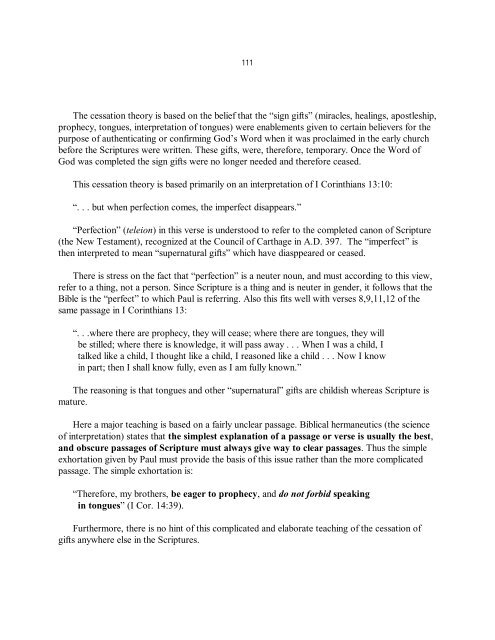The Gifts of the Holy Spirit: - Vital Christianity
The Gifts of the Holy Spirit: - Vital Christianity
The Gifts of the Holy Spirit: - Vital Christianity
You also want an ePaper? Increase the reach of your titles
YUMPU automatically turns print PDFs into web optimized ePapers that Google loves.
111<br />
<strong>The</strong> cessation <strong>the</strong>ory is based on <strong>the</strong> belief that <strong>the</strong> “sign gifts” (miracles, healings, apostleship,<br />
prophecy, tongues, interpretation <strong>of</strong> tongues) were enablements given to certain believers for <strong>the</strong><br />
purpose <strong>of</strong> au<strong>the</strong>nticating or confirming God’s Word when it was proclaimed in <strong>the</strong> early church<br />
before <strong>the</strong> Scriptures were written. <strong>The</strong>se gifts, were, <strong>the</strong>refore, temporary. Once <strong>the</strong> Word <strong>of</strong><br />
God was completed <strong>the</strong> sign gifts were no longer needed and <strong>the</strong>refore ceased.<br />
This cessation <strong>the</strong>ory is based primarily on an interpretation <strong>of</strong> I Corinthians 13:10:<br />
“. . . but when perfection comes, <strong>the</strong> imperfect disappears.”<br />
“Perfection” (teleion) in this verse is understood to refer to <strong>the</strong> completed canon <strong>of</strong> Scripture<br />
(<strong>the</strong> New Testament), recognized at <strong>the</strong> Council <strong>of</strong> Carthage in A.D. 397. <strong>The</strong> “imperfect” is<br />
<strong>the</strong>n interpreted to mean “supernatural gifts” which have diasppeared or ceased.<br />
<strong>The</strong>re is stress on <strong>the</strong> fact that “perfection” is a neuter noun, and must according to this view,<br />
refer to a thing, not a person. Since Scripture is a thing and is neuter in gender, it follows that <strong>the</strong><br />
Bible is <strong>the</strong> “perfect” to which Paul is referring. Also this fits well with verses 8,9,11,12 <strong>of</strong> <strong>the</strong><br />
same passage in I Corinthians 13:<br />
“. . .where <strong>the</strong>re are prophecy, <strong>the</strong>y will cease; where <strong>the</strong>re are tongues, <strong>the</strong>y will<br />
be stilled; where <strong>the</strong>re is knowledge, it will pass away . . . When I was a child, I<br />
talked like a child, I thought like a child, I reasoned like a child . . . Now I know<br />
in part; <strong>the</strong>n I shall know fully, even as I am fully known.”<br />
<strong>The</strong> reasoning is that tongues and o<strong>the</strong>r “supernatural” gifts are childish whereas Scripture is<br />
mature.<br />
Here a major teaching is based on a fairly unclear passage. Biblical hermaneutics (<strong>the</strong> science<br />
<strong>of</strong> interpretation) states that <strong>the</strong> simplest explanation <strong>of</strong> a passage or verse is usually <strong>the</strong> best,<br />
and obscure passages <strong>of</strong> Scripture must always give way to clear passages. Thus <strong>the</strong> simple<br />
exhortation given by Paul must provide <strong>the</strong> basis <strong>of</strong> this issue ra<strong>the</strong>r than <strong>the</strong> more complicated<br />
passage. <strong>The</strong> simple exhortation is:<br />
“<strong>The</strong>refore, my bro<strong>the</strong>rs, be eager to prophecy, and do not forbid speaking<br />
in tongues” (I Cor. 14:39).<br />
Fur<strong>the</strong>rmore, <strong>the</strong>re is no hint <strong>of</strong> this complicated and elaborate teaching <strong>of</strong> <strong>the</strong> cessation <strong>of</strong><br />
gifts anywhere else in <strong>the</strong> Scriptures.

















